If you’re joining us just now, follow the snake’s tail to the Prologue or climb a ladder to the Table of Contents.
Chapter 17: Samson Agonistes
The die was cast and a playing pieced advanced three squares.
“It’s your turn,” Niyati said.
Evan opened his eyes. Both he and Niyati were 7 years old. They sat on the hardwood floor of that mysterious clapboard house on the prairie. The Snakes and Ladders board was between them. The walls and rafters creaked in the wind.
He’d been here before—he was certain of it. Madame Blavatsky sat in her rocking chair near the potbelly stove. Her impassive faraway eyes scrutinized him.
“What happened?” Evan whispered.
Niyati seemed frightened. “I don’t know.”
“We were in the Field of Poppies,” he said. “We were searching for the Golden Path.”
“Yes,” she agreed, “but we were also in Hell.”
Madame Blavatsky cleared her throat. “It’s your turn, Evan,” she said.
He looked at her apprehensively. “I can’t play anymore.”
“Why?” Granny asked.
He touched his chest as a tear rolled down his cheek. “I no longer have the heart for it.”
“But you must make your move,” Granny persisted. “You have no choice—”
“I never have!” Evan jumped up and kicked the board across the room. The pieces scattered as he sprinted to the door.
“Evan!” Niyati cried. She rose and chased after him.
The door banged against the frame. The gusts to the east flattened the prairie grass. There were funnel clouds on the horizon in every direction. A weathervane (shaped like the dancing Shiva) turned crazily on the roof of the barn.
Evan turned to Niyati in panic and confusion. “I’m experiencing déjà vu in my dream!”
“Me too!” she exclaimed and gasped. She pointed to the west. Evan followed her gaze. At the edge of the cornfield Levi, dressed as the Cowardly Lion, was crouched at the foot of a hideous Scarecrow whose burlap face was painted like the face of a skeleton. The Scarecrow held a shaman’s staff; a trickle of blood ran down the pole it was impaled on.
“Hi, pal.” the Scarecrow said.
“That’s not Gordon!” Evan covered his eyes. “Levi! Is that you?!”
“Yes,” the Cowardly Lion replied.
“What’s happening?!” he shouted.
“We’re not allowed to say.”
Niyati seized Evan’s arm. “Evan, my ability to guide you is gone!”
“What?!—You’re making no sense!”
“The indwelling presence—the singularity or consciousness. Whatever it was, I no longer hear it! It’s still in me, but now it’s just lurking, listening. . . Evan, I no longer know why I’m in this dream with you!”
A nuclear bomb detonated in the west followed by an intense flash of light. The blast wave began creeping over the infinite corn maze of the land that was once called Kansas. The spreading mushroom cloud scattered the tornadoes which dissipated and vanished. In the translucent column of gold-white light that irradiated the sky, the three-faced Hindu god of Brahma turned on its axis.
“I am become Death,” the Scarecrow said, “the Destroyer of worlds.”
In the conflagration that swept over the landscape Evan felt his eyeballs deliquesce and burn away. He stumbled left and right but somehow remained on his feet.
“Evan!” Niyati screamed. “Where are you?”
His legs and arms lengthened. He felt his shoulders broaden. He was a man, but his limbs lacked the force and might they once had.
Niyati’s voice had matured. She sounded as though she stood several feet away. “I can barely make you out,” she said, “but I can see that you’re blind! Stay put, I’m coming.”
“How do you know I’m blind if you can barely make me out? You must be Manat!”
“Don’t say that, Evan! Don’t mention her name. You’ll summon her if you aren’t careful.”
Evan felt Niyati’s hand touch his wrist. “Don’t you remember me? I’m Niyati, the one who loves you.”
He drew away. His sight was gone, his locks were shorn—his strength and heart were stolen. All that had been his she had taken by deceit and subterfuge.
A cloud of dust hung over the infinite ruins of the Temple of Dagon.
“I know you,” Evan said, “You are Philistian Delilah. And I am Samson, who stands before you eyeless in Gaza.”
“You must trust me,” she said. “I am not the temptress you presume me to be. We are both being tried—both lost in a world of the gods’ devising, where confusion itself stands confounded. But though the gods have cast us into the ruffles of this fabric implicate, it is you who have spun its threads of its unsmooth grain.”
“Samson shall wander through the night,” Evan said, “though he walks in the light of day.”
Niyati somehow knew that, as Joshua had made the sun stand still over Gibeon, so too would the three faces of Brahma turn foreover on their axis over the ruins of Dagon’s infinite temple. “I shall guide us through this maze,” Delilah said, “to a path straight and sure.”
He allowed his hand to be taken by her—who had taken all else.
“I have no choice,” Evan said. “Why would the gods tempt those whose fate they have foreordained? Why would they bind in servile chains those whom they claim are free?”
“It is not your place to question the gods.”
“How is it yours to defend them?”
They walked in silence for 10,000 years.
During that time Evan sometimes thought he had forgotten the use of language. But phantom abstractions would rise up in his mind that could only be conceived of and articulated through grammatical formulae and verbal constructs. And when this happened it made him realize that he had not in fact forgotten the use of language, but had chosen—yes, chosen!—to believe he had. This was an accomplishment in and of itself because it demonstrated (at least in his mind) that the gods had been incapable of seizing control of his thoughts.
He often recalled that quotation inscribed over the portal of the academy of the Grand Watchers of the Ovoötes Void, which stated that absolute clarity was attainable only in absolute darkness. And as he pondered this quotation and how it pertained to his current dilemma, he would wonder if he had actually achieved enlightenment by choosing to believe that he had forgotten how to think in words. But then Samson’s broad shoulders would slump and he would grow depressed again when he realized that any attempt to formalize this theory into a proposition would require the use of words and that, no matter how often he chose to believe that he had forgotten the use of language, he never truly had.
One day, Niyati led him down a set of crumbling uneven steps. The heat of the sun’s beams on his face was replaced by the cool dampness of a mist. He heard the faint tattoo of dripping water, which suggested that they were underground.
Suddenly, he saw himself as others might have seen him because he was peering at himself (and Niyati) from a hammered bronze mirror hanging on the wall of a painted Minoan labyrinth. The diminished mannequin representing himself was a beardless adolescent clad in a Greek chiton. Niyati was dressed as Ariadne. She held a slender thread—the clue—to lead them out of the minotaur’s labyrinth.
Flaring lamps illuminated the walls of the sparsely furnished but gorgeously appointed chambers, all of which were adorned with frescoes depicting top-knotted youths somersaulting over bulls.
Scores of hammered bronze mirrors hung on the walls and Evan could see out of every one of them, simultaneously and all at once. His mind’s communis sensus and compositive faculty calibrated and compensated for the mirrors’ geometric relations to Niyati (and to the mannequin of himself that strode beside her). And these disparate and contradictory viewpoints were fused and consolidated into a single comprehensive image in his head, as if his eyes had become the eyes of a spider.
Niyati studied the mirrors suspiciously. She saw that his reflection in each mirror wore a sardonic grin. The Evan in the bronze mirrors could not only see but seemed to be in a Minoan labyrinth in a dimension parallel to the dimension that she was attempting to navigate (and to lead the two of them out of).
It occurred to Evan that, even though he could see Niyati and himself simultaneously, he could also feel the hand of the eyeless Evan holding Niyati’s upper arm. This was because Niyati had been forced to let go of the beardless youth so she could manipulate and pull the thread with both hands.
Evan overheard Niyati whispering to the blind mannequin walking next to her: “Manat is here,” she said. “She’s disguised herself as you and is watching us from the mirrors on the walls.”
“Not true,” Evan said petulantly. “The reflections you’re looking at are the real me. I’m not that puppet walking next to you.—I wouldn’t have grabbed your arm as he did, because I no longer care what happens to me in this dream.”
“Then I’ll take my chances with the puppet, since at least he has the will to go on.”
“I just thought of something,” Evan said. “Maybe I’m the one who’s being deceived. Maybe you’re Manat as I suspected you were when you led me into this labyrinth as Delilah.”
Before Niyati could answer, a giant shadow emerged from behind a red-and-black column. It wielded a double-headed Cretan axe. It was the minotaur. It bore down on the blind Evan and Niyati, and neither seemed aware of it.
Without a second thought, Evan reached through the mirror and grabbed Niyati before the minotaur could hurt her. He put her down next to him and saw that the reflection he had saved grew to full height.
Then he closed his eyes and waited for the axe to fall. But It never did.
“That was brave, Evan. Now I know it was really you all along.”
He opened one eye and saw that he was still alive. Then he opened the other and smiled at her. The bronze mirror he had pulled her out of became a fresco of a minotaur bringing down an axe on a blind youth who stood alone and oblivious of his impending doom.
Evan leaned his back against the painted wall. He slid down the rough plaster. His legs were parted, his knees bent. He looked down under his belt to make sure the skirts of his garment were covering his loins.
In the flickering lamplight, Niyati lowered herself to the ground. She eased her back against Evan’s chest. Then she drew his right arm over her midriff. He rested his chin on her shoulder and kissed her ear. Both seemed surprised by the other’s tenderness, and by how naturally and casually they had cuddled up.
“Do you still believe I’m Manat?” she asked.
Evan refused to respond. He was afraid that if he did, the obscure forces that had brought them together would separate them again. He didn’t know whether she was real or an illusion, but this was nice and he wanted to imagine that the woman in his arms was Niyati.
She fell asleep and felt his own eyelids drooping. “No,” he shook himself awake. “I can’t fall asleep or else when I’ll wake up, she’ll be gone.”
Suddenly he remembered a weird dream he had in which Levi, Niyati, and he were all in a shrine to Lord Shiva in the middle of an infinite corn maze. Levi was dressed as the Cowardly Lion—just like he was 10,000 years ago outside the house on the prairie.
“You’ve never prayed,” Levi said in the dream. Or at least Evan seemed to recall Levi saying something along those lines.
Maybe a prayer would work now! “Please,” Evan whispered. “I’ve learned my lesson. Let me go home—‘no place like home’ and all that. Let me wake up so I can meet the woman in my arms again, so that the two of us can start our life together.”
But he still didn’t know whom to address his prayer to. I can’t even believe in myself at the moment, so how am supposed to believe in a divine being? It’s not my fault I was created so skeptical.
“You’re fond of self-exoneration,” Madame Blavatsky remarked.
“What are you doing in my head?” Evan asked.
“You’ve fallen asleep, so you’re dreaming in your dream.”
“Great,” he groaned. “That means when I wake up, everything’s gonna be fucked up—Owww!!!”
“Stop swearing!”
“How did you slap me in my dream?!”
“Are you seriously asking me that after everything you’ve been through?”
“Why can’t I remember what happened after Niyati and I left Wonderland?”
“You haven’t entirely forgotten what happened. You just now ruminating on it.”
“What do you mean?”
“The shrine to Lord Shiva? The infinite corn maze?”
“Oh, yeah.—I forgot I remembered that.”
“Evan, to finish your quest, you must reclaim your heart. Niyati and I have been sent to guide you.”
Evan let what she said sink in before he responded. “There haven’t been any unborn universes in this part of the dream.”
“That is correct.”
“Well, I know that Manat fears unborn universes and that she’s more powerful when they’re not around.”
“Are you implying that I’m Manat?”
“Kinda. . . I mean, she had you under her control for a while. So she could put on a convincing act, if she was really you—”
“If she were really you.”
Evan mentally grimaced. And on the plane over the Pacific Ocean, the muscles of his sleeping face grimaced as well.
“Not only that,” Evan continued. “Niyati told me when we were back at that house on the prairie that she’d lost the ability to guide me in the dream.”
“Yes?”
“Well, that would contradict what you just said about how you and she had been sent to guide me.”
“Your mind has grown subtle.”
“I’ve had time to think about stuff while walking around ruins of the Temple of Dagon for 10,000 years. Anyway. . . I kinda wanna think you’re actually Madame Blavatsky.”
“But I detect doubt in your voice.”
“Funny you use that word: doubt. It’s at the crux of my current dilemma.”
“Please explain,” she said.
“Well, I took a psych class during my freshman year at UCLA. And the professor told us in class that people don’t dream in color. I thought that was a weird thing to say, since I’ve been dreaming in color since I was a kid. Plus, when I’m awake everything has a special tint or hue to it. For example, if someone tells me a hilarious joke early in the morning, the joke is lime-green and dappled with sunlight.—Aaaand, even though I don’t know what dappled means when I’m awake, I do know the word is chrome-blue because of the way it sounds. So when I was a kid—”
“You’re still a kid,” Madame Blavatsky interrupted.
“When I was a kid,” Evan repeated, “I overheard my dad telling my mom that the reason I liked sleeping next to an electric fan was due to the white noise that the fan generated. And I wondered why he called it ‘white noise,’ because it’s sand-colored like the smell of car exhaust.”
“What you’re describing is called synaesthesia,” Madame Blavatsky remarked. “It’s one of the reasons you were chosen.”
Evan ignored her. “Anyway, in my mind, doubt has always been auburn-black in color. However, in this dream, auburn-black is supposedly the color of prophecy. But whenever I dream about the professor in the psych class telling us that people don’t dream in color, he appears in the dream wrapped in an auburn-black mist, because, even in my dream, I’m doubting that what he’s teaching us is true.—But now that I think about it, I’m wondering if maybe there’s a correlation between doubt and prophecy. Because if that was the case, it would mean that the professor had been right all along and all of the supposed dreams I had had ‘in color’ were actually due to the fact that I wasn’t dreaming at all but was awake—but, like, awake in another dimension. Does that make sense?”
“Yes.”
This emboldened Evan. “But that would mean. . . ” He paused and scratched his astral chin. “It would mean,” he repeated, “that I’ve never actually had a dream in my life, since my dreams have never been in black-and-white.—Oh, except for one time I dreamed about an episode of the Three Stooges I’d seen, but that’s because the episode itself had been in black-and-white, so that doesn’t really count.”
Evan decided he’d better get to the point before Madame Blavatsky stopped listening. “So if the psych professor was right, then this isn’t a dream at all, since it’s full of colors. . . But that doesn’t explain why things prophetic on the Astral Plane are auburn-black, since I associate that color with doubt. So I guess that’s why I haven’t really believed that there’s anything prophetic about this dream since it’s started. . . ”
Madame Blavatsky was no longer there. Evan wondered if he’d in fact been conversing with her. But his doubt was dispelled by a prophetic flash of auburn-black light that jolted him awake.
Niyati was gone. He was still in the Minoan labyrinth. But the floor was shaking and the plaster was flaking off the walls. The room was getting excruciatingly hot.
“Niyati!” he cried out. There was no answer.
He ran out of the room, as the pillars cracked behind him. In the unlit chamber he entered, an open door stood off to the left that seemed to lead outside. He heard a mob screaming and the stern voices of men shouting orders. He ran to the door, holding his arms up in front of him to avoid colliding with something in the dark. The roof of the labyrinth was collapsing.
He exited onto the cobblestone streets of Pompeii. The sky glowed a hellish red. The summit of Vesuvius belched fire and the air was thick with smoke.
Evan coughed as ash seared his skin and entered into his lungs. He ran past the corpses of men and women, of dogs and donkeys. He saw that some of the bodies were already cased in pumice as they had appeared to excavators hundreds of years later when they were disinterred.
Is this the Shattered City? he wondered.
There were ghostly tourists standing in the streets, laughing and pointing at the pornographic frescoes on the walls and at the phalluses carved into the cornerstones on the streets. The tourists photographed one another as the citizens of the doomed city collapsed and writhed in agony at their feet.
Evan stumbled toward a wooden strong box that a dead merchant had been trying to drag down the street. He sat down on it and pulled his chiton over his head to form a bubble of air so that he could breathe. Modesty no longer mattered. He was naked and had drawn all of the cloth covering his skin into a wadded mask over his face. His back, his shoulders, his legs were burning away. His throat was parched. He wanted nothing more than to quaff gallons of water before he died. But there was no water available.
Then the cries, the shouting, the rumble of Vesuvius and the clicking of the tourists’ cameras died away. He no longer felt the heat. He was still seated. Behind him he heard hundreds of people hammering nails into wood, mixed with the distinct sound of hundreds of rattlesnake tails.
He let the cloth fall from his face.
He was dressed as a cowboy, sitting on a mail crate in the middle of a dirt road. The road ran through an abandoned town in the Wild West. The streets branched off into hundreds of side roads, lanes, alleys and byways. All of the walls—the walls of the saloons, the dry-goods stores, the Protestant churches—were hung with magic mirrors in carved oval frames. The mirrors reflected other streets and buildings in this infinite Wild West ghost town.
Evan looked behind him in the direction he’d heard the sound of the hammering and the rattlesnakes’ tails. The snakes were coiled up on the plank sidewalks and rooftops—in the dirt roads and in the wagon ruts. There were ladders propped up against the buildings. Stagecrafters stood on each ladder hammering away. They were preparing the next scene, because, in addition to being an infinite ghost town (that had never existed and never would), Evan was on the set of America’s favorite sitcom.
The workers stopped hammering and turned on the ladders to face him simultaneously. Then the rattlesnakes and stagecrafters grew transparent and vanished, because the set of America’s favorite sitcom was actually a ghost town.
Evan raised his eyes to the balcony that ran along the upper floor of a building that had a broad sign over the door that read: MADAM BLAVATSKY’S WHOREHOUSE OF DESTINY.
On the balcony seven rouged copies of Niyati stood, each gazing into a handheld magic mirror, which reflected back the face of the demoness Manat. Madam Blavatsky stepped onto the balcony, wearing an ostrich-feather hat.
With great effort, the seven Niyatis lifted their eyes from their mirrors. “I don’t understand,” they asked. “Why are we here? Why is my attention fixated on this monster’s face?”
“Evan has put us here,” Madam Blavatsky replied. “Because not only has he lost his memory and heart. He has now lost his ability to trust us. But this is Manat’s doing.”
“How so?”
“Manat has been restricted from attacking Evan outright in this portion of his dream. But she has been granted permission by the Havasupai man to alter the environment so as to make Evan suspicious. It was Manat who put the distance between you and Evan when the atom bomb robbed him of his vision. You had been standing next to him only seconds before. Manat knew this would confuse him. And it was she who removed Evan’s mind from his astral form and placed it in the mirrors of the Minoan labyrinth. She is trying to drive him mad, because she knows that if he doubts everything, he will never be able to find his heart.”
No sooner had Madam Blavatsky said this, than the seven Niyatis looked into the mirrors they held. The child demon laughed behind the glass—and this made the reflections of Niyati laugh too, since they had no choice but to cast back the image of the demoness’s face. Manat was sat before seven dressing table mirrors in a vast and gaudy boudoir, which was located downstairs in the whorehouse of destiny.
When Evan saw the seven reflections of Niyati laughing on the balcony of the whorehouse, it confirmed his suspicion that it had indeed been Manat who had fallen asleep in his arms in the Minoan labyrinth—and it must have been Manat speaking to him in his dream in the guise of Madame Blavatsky. Everything in the infinite ghost town was auburn-black hue, the color of doubt and prophecy.
“Great look, pal!”
Evan turned to face Gordon, who sat in front of him in a canvas-backed director’s chair. Levi was the cameraman.
“Remember,” Gordon said, “you’re a gambler in this scene, a man who’s played his last hand—and lost. You see no point in going on.”
The shrill whistle of a train sounded in the distance.
“You hear that?” Gordon remarked. “The train is comin’ to take you away—to the next leg of your trip. . . But you’ll never get to the Shattered City without the help of your lady love.” The director gestured to the balcony of the whorehouse.
Evan refused to look up. “I’m done with this game,” he said.
“But why?” Gordon asked.
Evan touched his chest and repeated what he’d told Granny over 10,000 years ago in that small clapboard house on the prairie: “I no longer have the heart for it.”
“Awww,” Gordon said with a sly grin. “There you have it, folks. The whiniest little bitch west of the Mississippi. If you had any self-respect, you’d apologize for the way you’ve treated her—for the way you’ve treated all of us, in fact. You’re the one who put us in Hell, pal. And you’re the only one that can get us out of it. . . Cameraman! Let’s get a closeup of that pouty mug!”
Evan stared leadenly at the camera, as Levi trained the lens on his face.
“Wait for it,” Gordon raised his hand. “Pan in. . . Aaaaand, cut!”—And the screen went black as the canned laughter laughed.




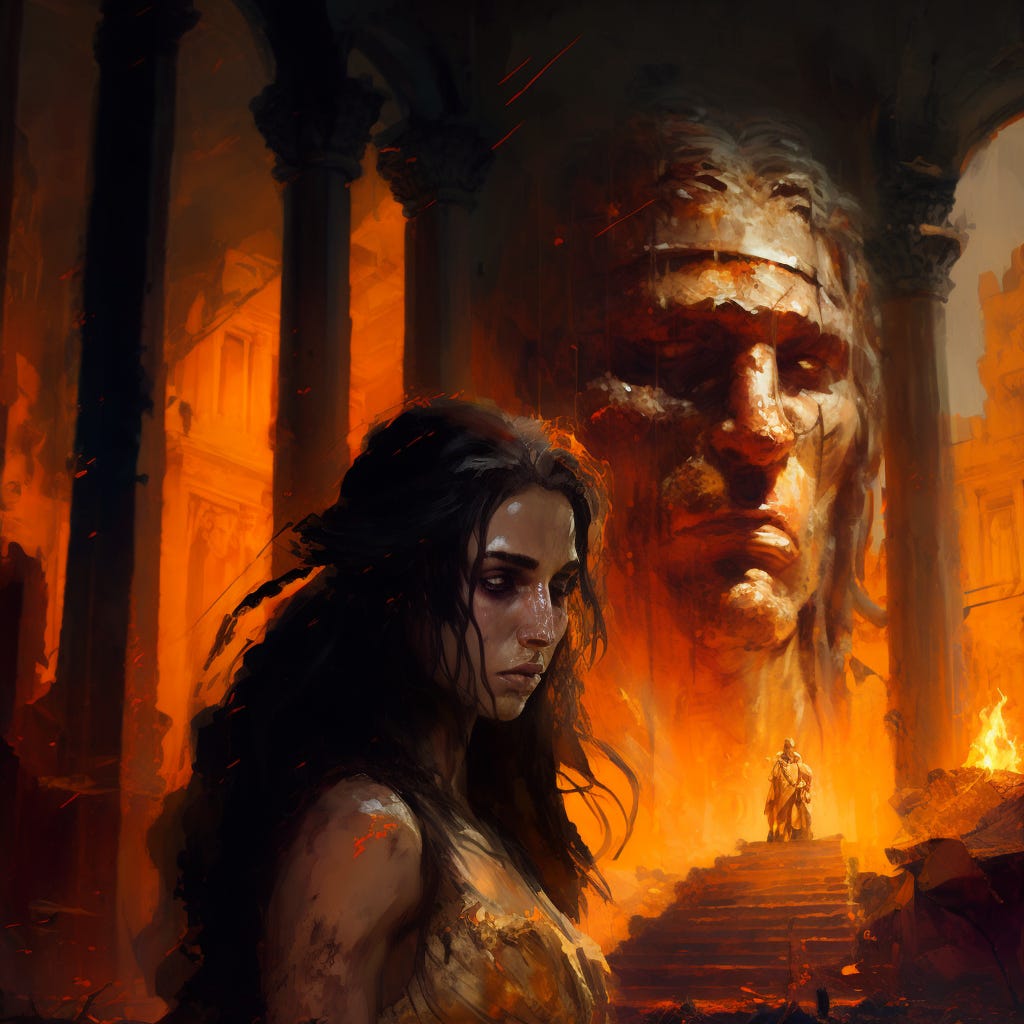
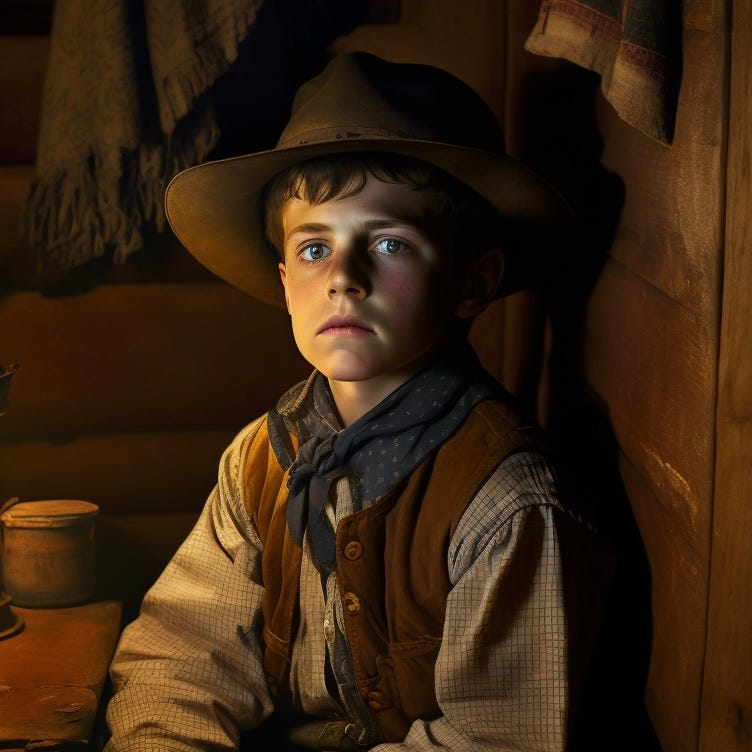

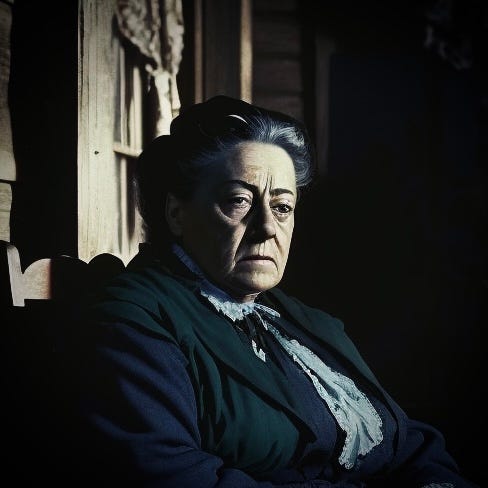


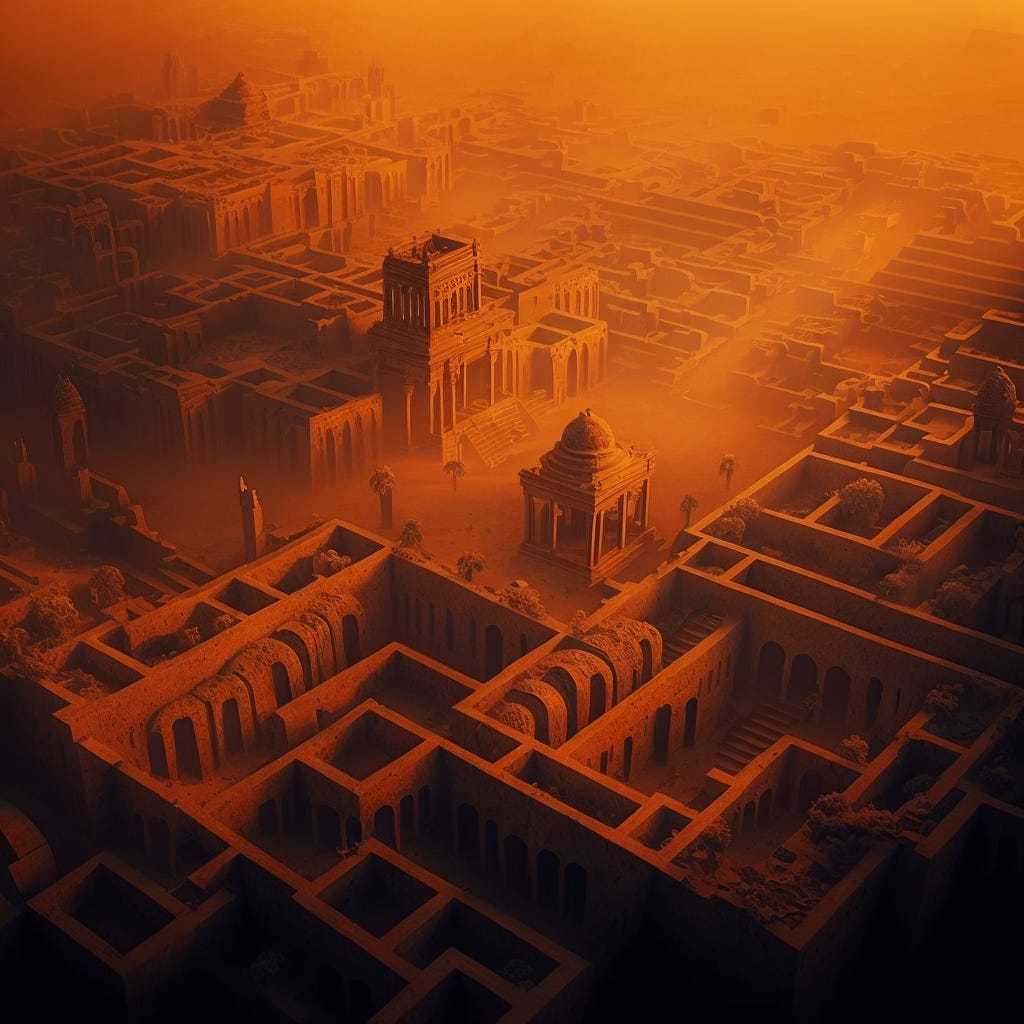
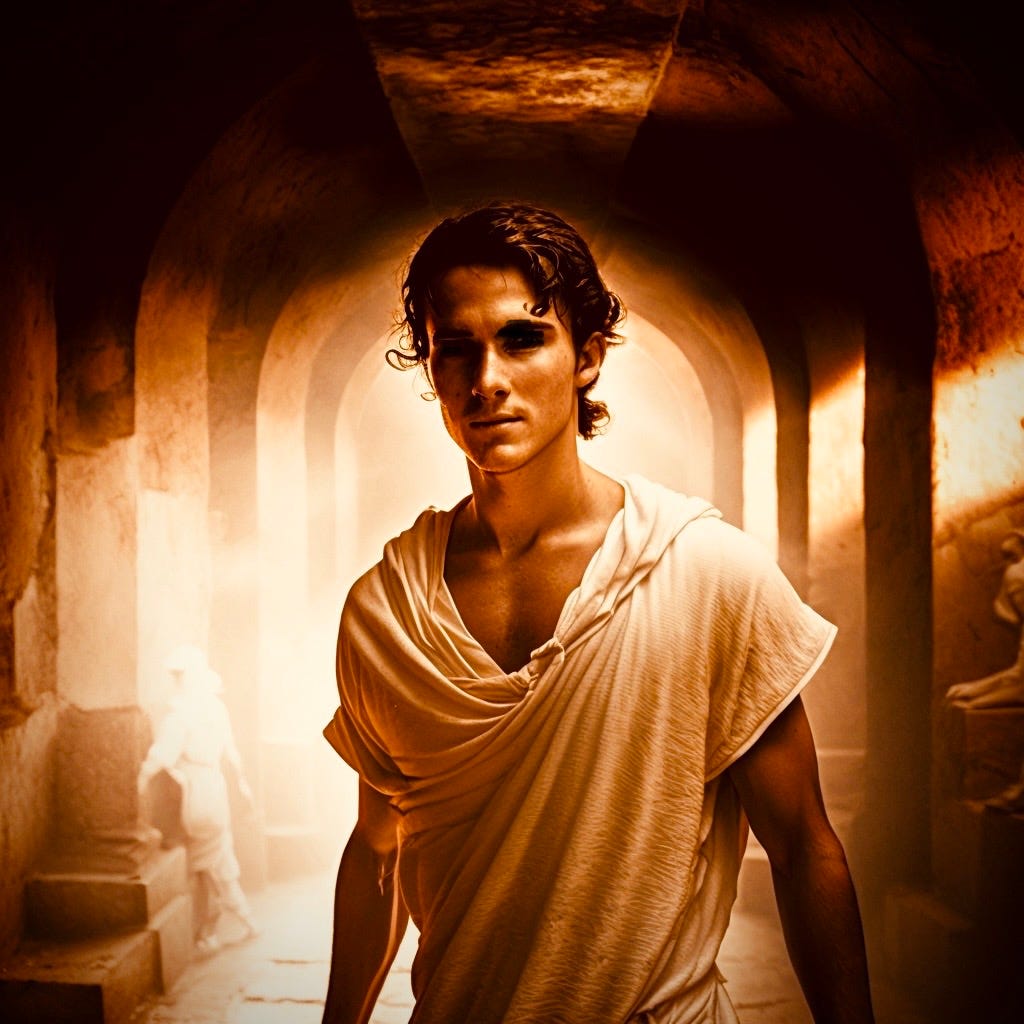
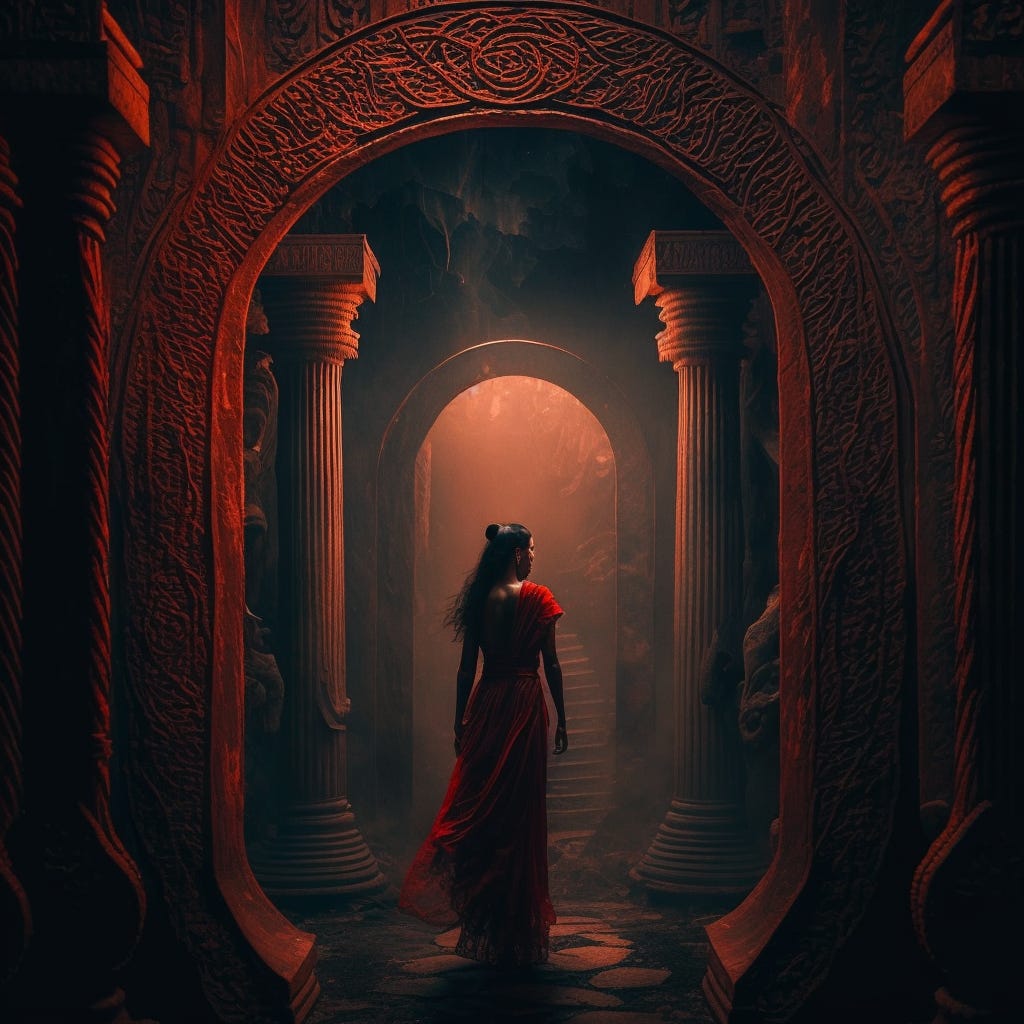
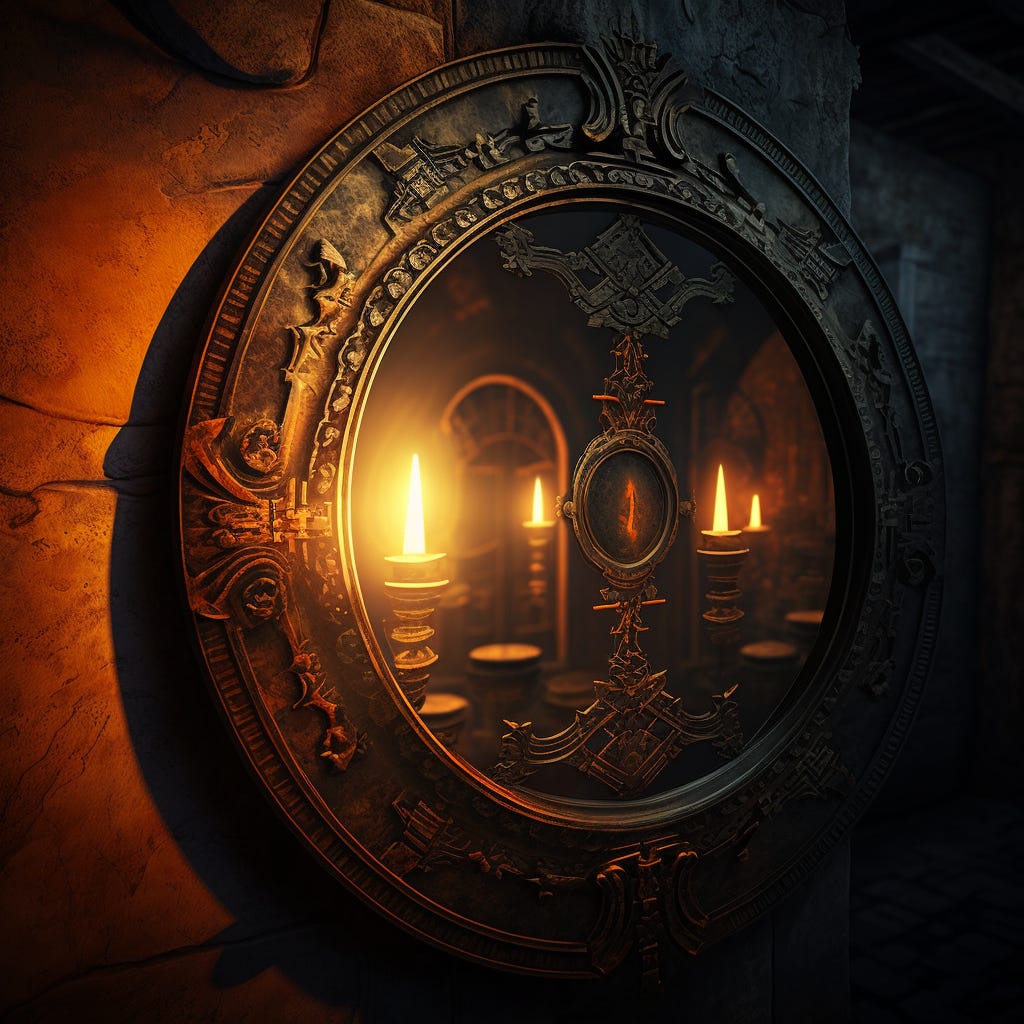
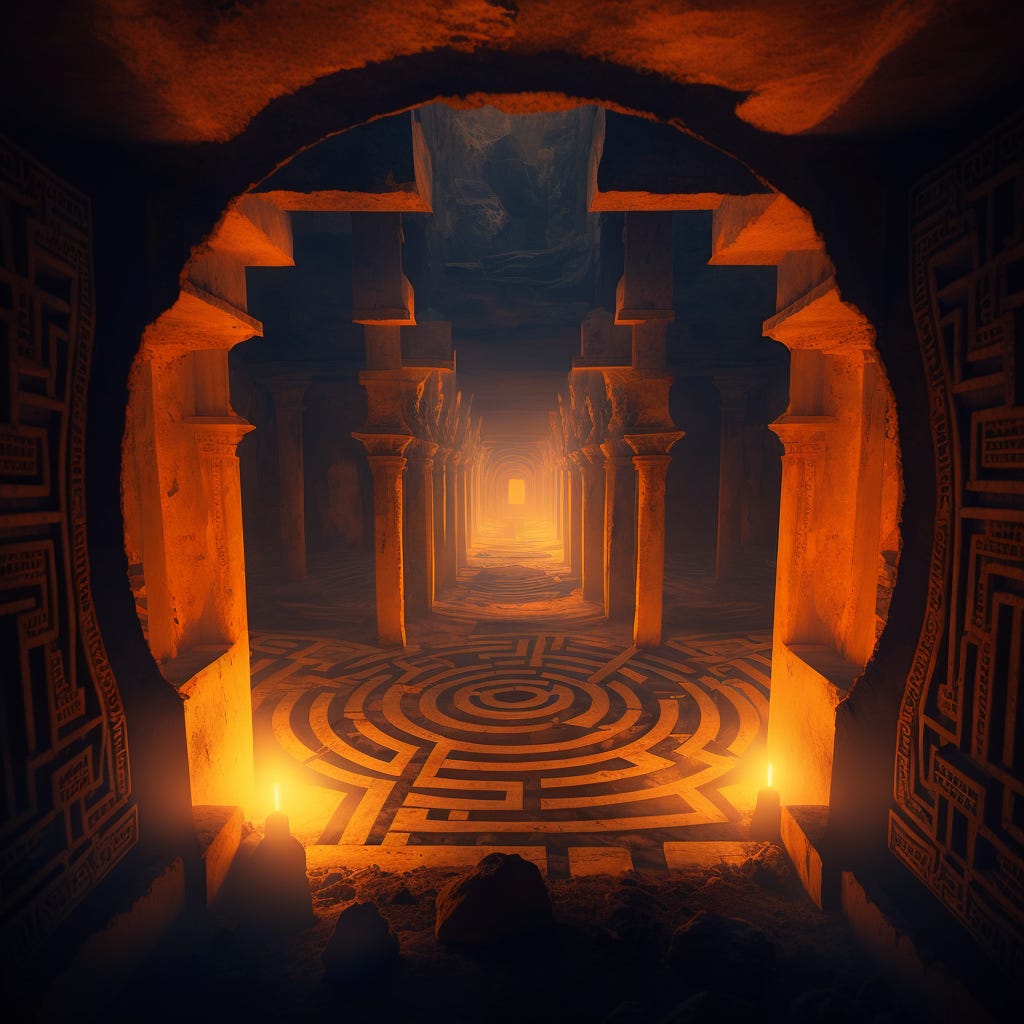
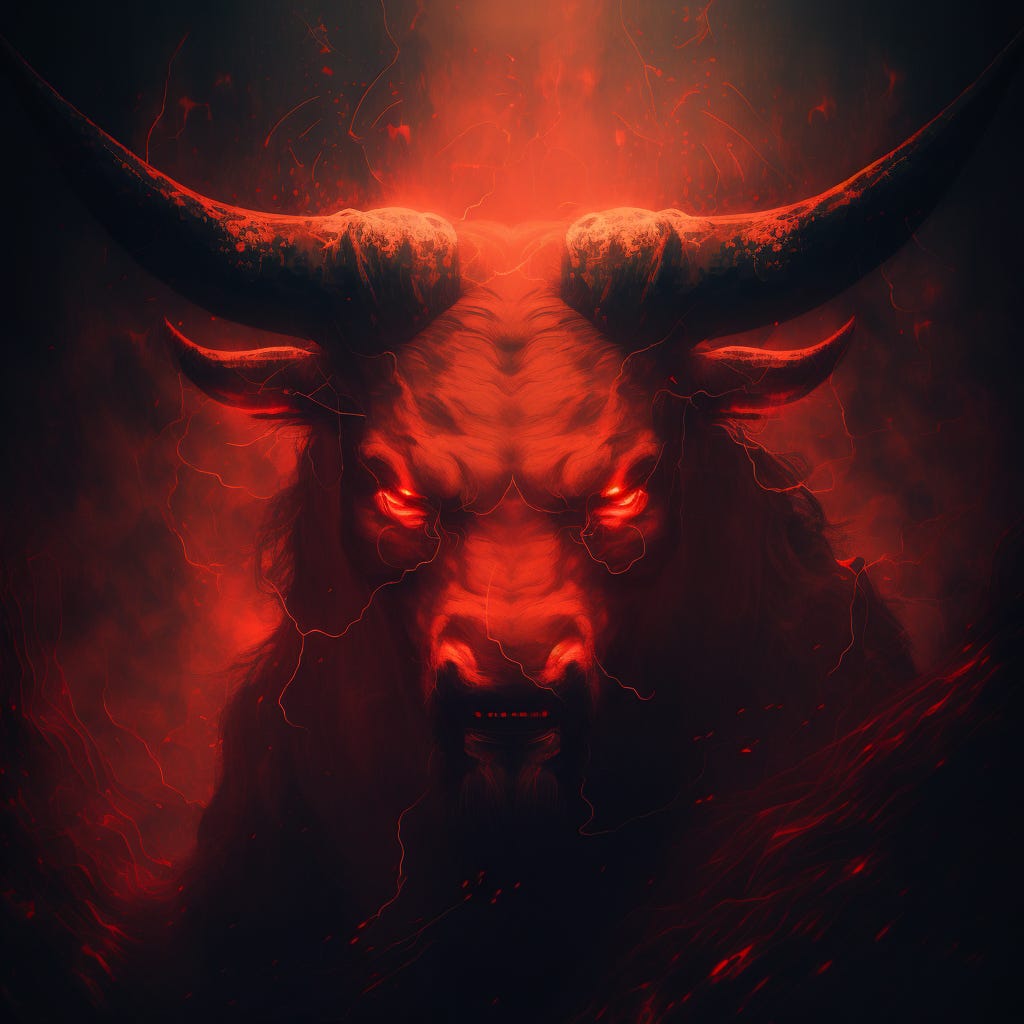
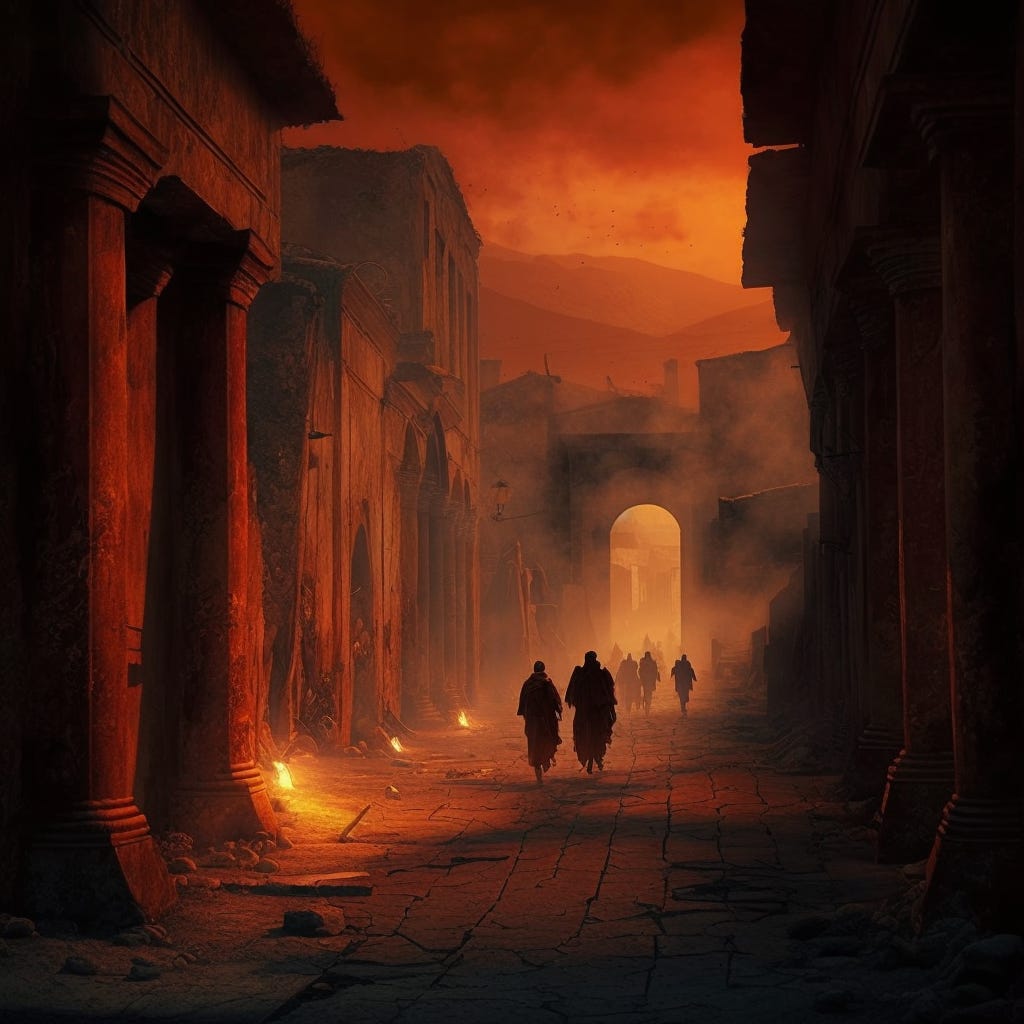
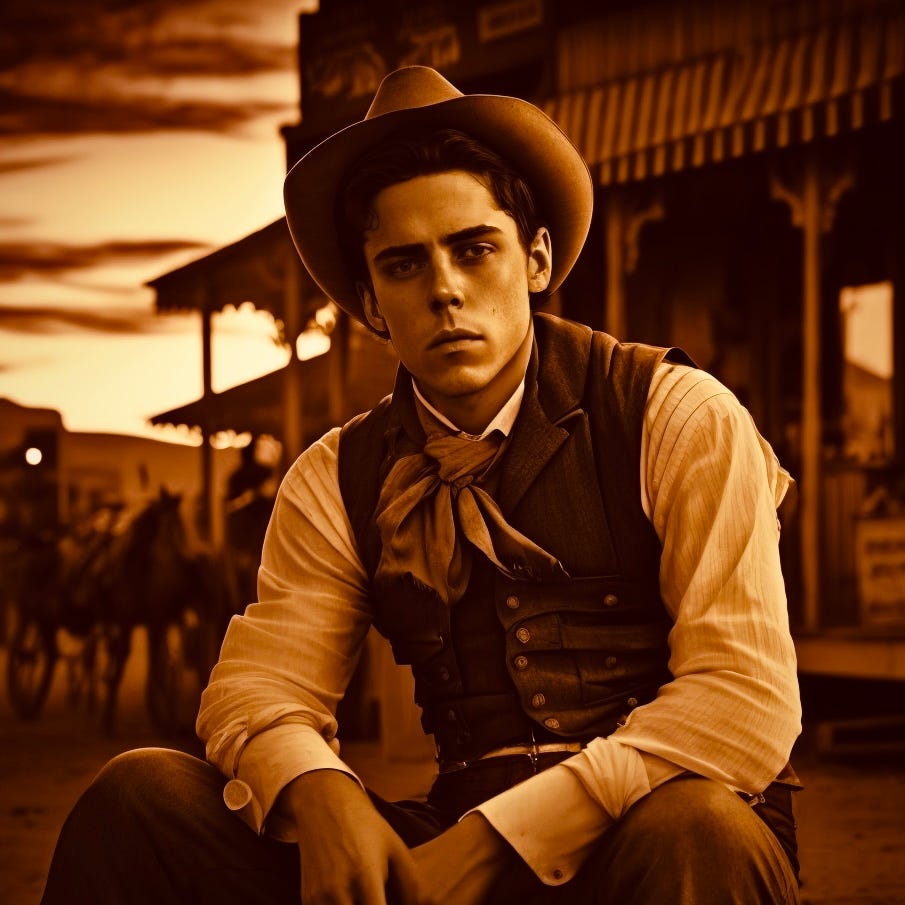
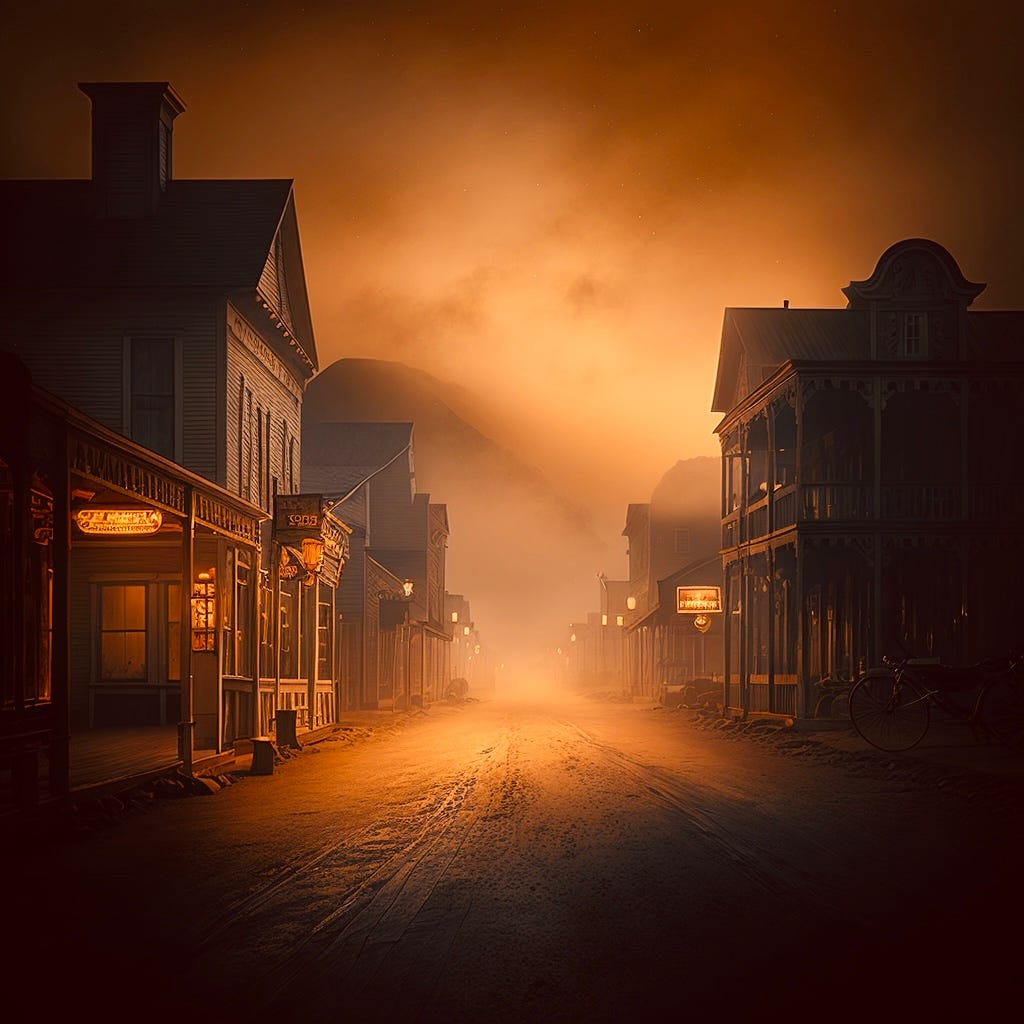
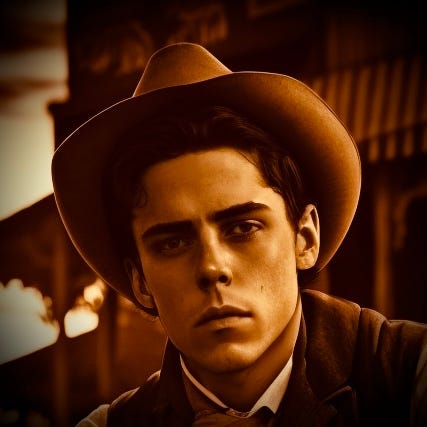
"Whorehouse of Destiny" is also the perfect title for a political satire ;-) I was really taken with the image of ancient and modern Pompeii superimposed. As fascinating as the city is, there's also something kind of gruesome in tourists walking around through what is a mass casualty site, stepping around the casts of bodies, etc. The scene kind of reminded me of my visit to the archaeological museum in Dublin where several bog bodies are housed in a discreetly partitioned area, and a girl and her boyfriend were in there taking selfies with them :-|
edits:
-house on the prairie/*
-she knows that if he doubts everything, he he* will never be able to find his heart.”